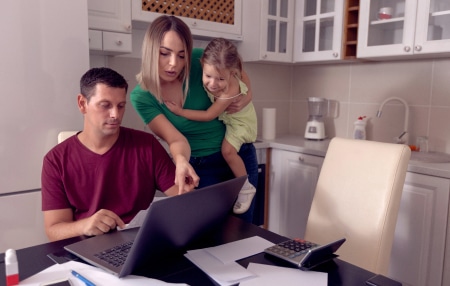
Having a child is a life-changing experience. There’s rarely a dull day (or a peaceful night). But—and here’s the thing very few people tell you—having kids can be very expensive. Welcoming a new child into your family can drastically change your financial situation, and this is why budgeting is so important.
To help you prepare your finances ahead of a new family arrival, in this guide we answer some of the most common questions expecting parents ask when it comes to budgeting, as well as provide our top tips.
Why should expectant parents make a budget?
Expectant parents should definitely think about making a budget because, let’s face it, babies come with a whole bunch of expenses. When you have your first child, your life changes forever.
For the first time in your life, you’re not only responsible for yourself but also for the wellbeing and future of a little one too. This is a huge responsibility and can be very overwhelming. Budgeting can help to prevent you from overreaching financially and falling into debt by keeping your spending in check and ensuring you’re not overspending on unnecessary items. It’s like having a financial safety net to catch you if things get tight, so you can focus on enjoying those precious moments with your newborn without worrying about money troubles.
Aside from keeping you in check and stopping you from falling into financial trouble, the primary purpose of a budget is to help you to accurately figure out how much money you’ll actually need to put aside for the essentials. Once you sit down and really think about this for the first time, you might be surprised how much you need to account for.
First, there are clothes. If you think the Kardashians like to change outfits a lot, they don’t come close to a little one. One minute they’re clean and dry, they’re next they’re wet and covered in goo. Then, there’s all the kit – Moses basket, cot, blankets, pram, bottles, steriliser, toys, nappies, nappy cream, wet wipes, bubble bath, miniature towels with hoods (essential)…
Then, they grow. All the time. And you have to start over again. The good news is, kids only tend to live at home nowadays until they’re around 25. So you only have to survive a quarter of a century.
As well as paying for the here and now essentials and stopping you falling into debt, budgeting can also act as a roadmap for your money, helping you spend wisely and start saving up for the important things in life, like university funds, family holidays and first home savings. It also gives you peace of mind knowing you’re financially prepared for whatever parenthood throws your way.
How to budget for a baby
As our tips below highlight, budgeting for a baby involves the balancing act of planning ahead and prioritising expenses to ensure financial stability without falling into the trap of unnecessarily overreaching. This is easier said than done, of course. When you are expecting for the first time, ironically, you really don’t know what to expect. This is natural. However, start budgeting by assessing your current income and expenses. Then, estimate the additional costs of absolute essentials like nappies, clothing, and childcare.
Whether you choose to use digital spreadsheets or an old-fashioned ledger to estimate and track your spending, keeping on top of it is essential. After all, by doing this you’re not only ensuring you’re accounting for all the essentials you and your new family need to function, you’re also keeping track of your spending and keeping yourself out of the red and in the black.
On top of this, you can also use your budget to look for ways to save money, such as finding economies in the items you buy regularly and utilising discounts or benefits.
Finally, it’s also crucial that you regularly review and adjust your budget and when it is needed. With the cost of living increasing all the time, even a small change in income or increase in the price of an essential item can make a huge difference. The sooner you can account for these changes—whether that’s a positive or negative change—the more quickly you will be able to adjust. This ongoing proactive planning can help you to manage the financial aspects of welcoming a new family member more effectively, keeping your head above water.
Budgeting for parents: our top tips
Here’re a few tips to help you stay financially stable:
- Bin your ‘What-to-buy-baby’ list. You don’t need half of the stuff on it. A hairbrush and comb set? Nail scissors? Scratch mitts? You’re starting a family not a beauty salon.
- Babies do not need shoes. Miniature trainers might look unbelievably funny but until they’re walking you’re just wasting your money.
- Fact: it’s easier and quicker to bath a baby in a washing-up bowl than a baby bath. Take the dishes out first, obviously.
- Moses baskets, wicker carrycots – lots of fancy names. Very little use. They look adorable, but babies grow out of them ridiculously quickly. Literally in just a few weeks. That’s why charity shops are full of them.
- Babies are not fussed if their initials are embroidered on a blanket.
- Baby equipment is so expensive. So don’t be embarrassed about buying second-hand. It’s outgrown so quickly you’ll find most things are nearly new anyway. Barnardo’s Children’s Charity shops have brilliant bargains.
- There are always lots of free samples and vouchers at antenatal clinics, baby groups, nurseries etc. Take as many as you can carry.
- Ditto online offers.
- Buy baby clothes with room to grow. Newborn outfits won’t fit after a few weeks. Invest in the next size up.
- Don’t stock up on bottles. There are so many different shapes and sizes and babies are very particular. Junior might not take to the one you’ve bought 12 of.
- Write a list of what you need and pass it around friends and family. It’s better they spend their money on things you need, rather than six-foot bunny rabbits you’ll spend the next year falling over.
- Ask for essentials and items for a six-month-old and one-year-old. Most people buy the smallest, cutest, most ridiculous outfits that will never, ever see the light of day.
- Add an item to your weekly shop. Sticking a bag of disposables or a bottle of baby bath in the basket each week helps spread the load.
- Buy the basics from supermarkets. Multi-packs of vests, all-in-ones, bibs, socks. Consider opting for a neutral colour rather than pink or blue, so you can pack them away for the next one. (Just saying).
- Don’t always go for the cheapest nappies. Strange tip in a ‘how to save money guide’. But some cheap ones’ leak, so you’ll need to change them – and the wet clothing – more. Road test before bulk-buying.
- Rein back on the toys. You do not need to fill your home with brightly coloured plastic tat. Babies like nothing better than playing with their toes. Or your nose. And small kids can fill an afternoon pretending a cardboard box is a castle.
- Don’t buy clothes too far in advance. They might be a bargain. But kids have growing spurts when you least expect them to and that warm winter coat won’t be that cosy if you can’t button it up.
Finally, take a breath and enjoy the moment. They’re worth every penny…

